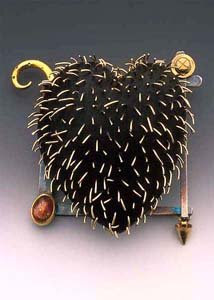
When I was a teenager in the 1970's, my paternal grandfather would come to visit on occasion from Broken Arrow, OK or Gravette, AR - wherever he was living at that time. He'd drive up in his big yellow station wagon and we'd go to the art museum (it was the Nelson Art Gallery back then, now it's the world-class
Nelson-Atkins Museum of Art), the local "health food restaurant," because he was a vegetarian, and the art supplies store. He always smelled of fresh soap and oatmeal.
Opa (my father's family is Dutch), was a self-taught artist (I snagged the painting above from his belongings after he died) and writer who had an appreciation for anything that enhanced life. He was kind and empathetic, concerned about the welfare of all living creatures, reverent and respectful, and still he was a hedonist in every sense of
the definition.
Opa was a
Theosophist. Most Americans aren't too familiar with the teachings of
Madame Blavatsky. Her philosophy brought my grandfather friends from all over the world. Opa met my grandmother (Oma, of course) when, in Utrecht, Holland, he came across a meeting of the
Theosophical Society and became interested in it. This was particularly disconcerting to his father who was an Orthodox Christian minister, but Opa was in love and undeterred.
Portrait artist
Frank Szasz was a close friend to my grandfather and a fellow Theosophist. They met once when their eyes locked across a room and both were convinced they'd known each other in previous lives (reincarnation is a facet of the Theosophical philosophy). Most people are familiar with some of his portraits, which he rendered from life and from photos. Presidential portraits were a specialty of his, but he loved to capture interesting people in general, especially if they'd made a mark on his life or human life in general. To wit, his famous poster of
Einstein:

This happened to Opa frequently, meeting the fascinating. He knew
Lili Kraus, the famous Hungarian classical
 Lili Kraus
Lili Kraus
pianist (whom I met as a teen) and a very charismatic Egyptian stained glass master, Fadel, who had a wonderful shop here called Fadel's Stained Glass (we used to go there when we were kids and cut glass - I loved it). I never knew his first name, we just called him Mr. Fadel.
The one thing all of my grandfather's friends had in common was an intimate familiarity with oppression. Ms. Kraus was in a labor camp at one time, as was Mr. Szasz. I don't remember the nature of Fadel's oppression, but each of these people was deep and there was a brooding side to all of them. They were kind, but formidable, and I surmised being oppressed, repressed and suppressed was part of what made them this way.
I sat with my grandfather one afternoon as he regaled us with the family's escape from Europe as Hitler's army marched across and took it. It's too long to recount the entire story here, but I may in a future post. Oma's father had been Jewish and Opa knew that would be her end, as well as the end of his four sons.
So, from
Compiègne, France, where they were living at the time, Opa manipulated his connections at Schell Oil and he and his family managed, against all odds, to escape on an oil tanker to
Curaçao, in the Netherlands Antilles. From there, the family members all eventually moved on to different parts of the USA, where they were educated, married, and had children. I'm a product of that, and it's miraculous that I'm here at all. While telling the hours-long story, Opa would punctuate different parts of it with, "How can it be that I am here to tell this?" At one point I reminded him that if he weren't here to tell it, we wouldn't be either.
My Opa attracted the attention of fascinating people everywhere he went. He was an ambassador of sorts, and what my brother would call an "old soul." I loved him dearly and think of him almost every day.
So, with this post, I honor my wonderful grandfather, whose last words to me were, "You are very dear to me, Becky." He was very dear to me.
 In my ongoing quest for the best locally-owned services and retail establishments here in Kansas City, I've recently become aware of a great little shop in the Prairie Village Shopping Center (6911 Tomahawk Rd.) that specializes in home decor: Stoney Broke, Ltd.
In my ongoing quest for the best locally-owned services and retail establishments here in Kansas City, I've recently become aware of a great little shop in the Prairie Village Shopping Center (6911 Tomahawk Rd.) that specializes in home decor: Stoney Broke, Ltd.






























































